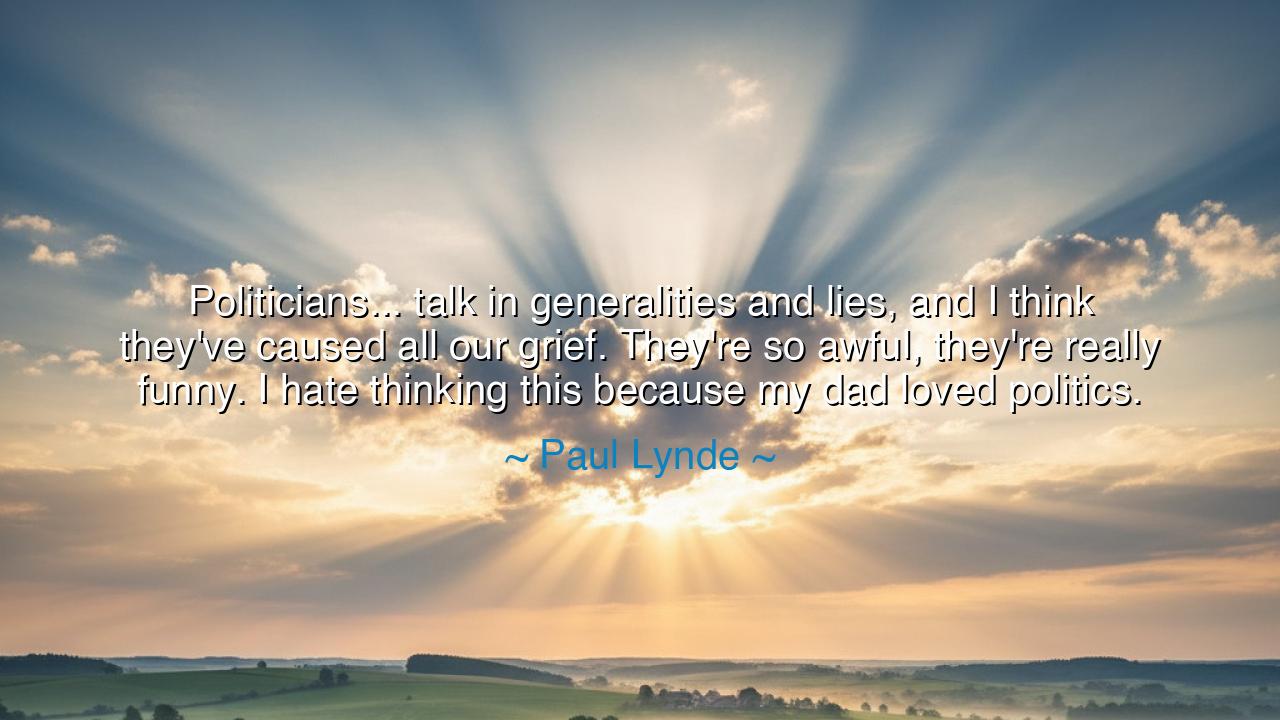
Politicians... talk in generalities and lies, and I think they've
Politicians... talk in generalities and lies, and I think they've caused all our grief. They're so awful, they're really funny. I hate thinking this because my dad loved politics.






“Politicians… talk in generalities and lies, and I think they’ve caused all our grief. They’re so awful, they’re really funny. I hate thinking this because my dad loved politics.” Thus spoke Paul Lynde, the master of sharp wit and hidden sorrow, whose laughter often masked a heart heavy with truth. Beneath the humor of his words lies an ancient lament—a cry that has echoed through every age of civilization: that those who rise to lead too often lose sight of those they lead. In his jest burns the wisdom of a cynic turned philosopher, one who saw the tragic comedy of power and could only survive it through laughter.
When Lynde says that politicians talk in generalities and lies, he exposes a wound as old as the city-state itself. For the language of power, when corrupted, ceases to clarify and begins to obscure. The generalities soothe the crowd with promises that mean nothing, while the lies comfort the listener with illusions. Thus, the people are left hungry not for bread, but for honesty. And yet, Lynde calls it funny—not because it is lighthearted, but because it is absurd. His laughter is the laughter of despair, the laughter of one who has looked upon folly so great that only irony can bear its weight.
The origin of this truth reaches back to the ancient world. The philosopher Diogenes wandered Athens with a lantern, seeking an honest man, and found none among the politicians or orators. The Roman poet Juvenal wrote of corruption in the Senate and mocked those who sold honor for coin. Even Plato, the philosopher-king of thought, warned that when rhetoric replaces reason, democracy devours itself. Lynde, though a man of modern wit, spoke the same eternal truth: that those who shape public words shape private destinies, and when their words grow hollow, grief follows like a shadow.
And yet, even in his disdain, Lynde reveals tenderness. “I hate thinking this, because my dad loved politics.” Here the laughter breaks, and the man beneath the comedian speaks. He honors a generation that believed in the nobility of public service, when politics was seen not as performance, but as duty. His father’s faith represents the hope that power could serve truth, that governance could reflect virtue. But Lynde’s sorrow shows the fracture between that ideal and the world he came to know—a world where politics became theater, and truth, the first casualty.
The funny he speaks of is not joy, but irony—the kind of humor born from pain. It is the laughter that defends the soul when disillusionment threatens to consume it. He finds comedy in the awfulness of politics not because it deserves amusement, but because laughter becomes survival. The ancients, too, used satire as shield and sword. The playwright Aristophanes mocked the politicians of Athens so that his people might awaken through laughter. In this way, Lynde continues their tradition: he turns his despair into jest so that truth might slip past indifference.
But we must not mistake his humor for apathy. When he says politicians have “caused all our grief,” he speaks of something moral, not merely political. For deceit in high places breeds despair among the people. It teaches the young to distrust, the poor to accept injustice, the weary to grow cynical. Lynde’s words warn us that when those entrusted with truth trade it for advantage, the soul of a nation decays. His laughter, then, is both shield and alarm—a cry disguised as a chuckle.
So, dear listener, learn from this paradox. Do not despise politics, but hold it accountable. Do not abandon belief in governance, but demand integrity of those who wield it. Let Lynde’s irony remind you that laughter can expose falsehood, but only action can heal it. Seek leaders who speak with clarity, not generality; with courage, not deceit. And when the times grow too absurd to bear, laugh as he did—but let that laughter awaken you, not numb you.
For as Paul Lynde teaches, the world of politics may always flirt with folly, yet the responsibility to demand truth remains ours. The funny thing, as he says, is not that leaders lie—it is that people grow accustomed to it. Therefore, resist that habit. Keep your laughter sharp, your heart honest, and your vision clear. In doing so, you will turn cynicism into vigilance—and grief into wisdom fit for the ages.






AAdministratorAdministrator
Welcome, honored guests. Please leave a comment, we will respond soon